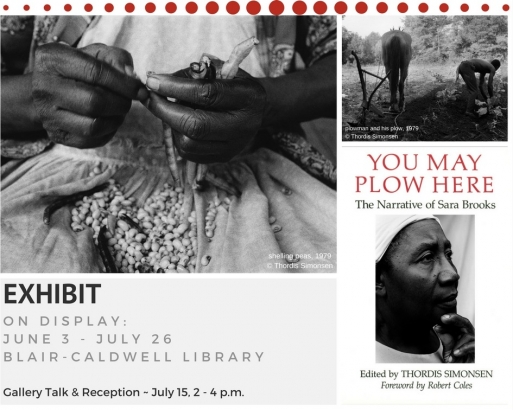You May Plow Here: Photographs of Alabama Mule-Farming in the 1970s by Thordis Simonsen
On Display June 3 - July 26
Gallery Talk & Reception: Saturday, July 15, 2-4 p.m.
For the first time in three decades, Thordis Simonsen’s evocative black and white photograph exhibition will be on display in the Cousins Gallery at the Blair-Caldwell African American Research Library. The exhibit documents vestiges of a quickly vanishing way of life: board houses set on rocks, potato banks, a basket-maker, a plowman. A lifelong friendship with Sara Brooks, an Alabama native, allowed Thordis to capture a rare glimpse into the life of an African American farming community.
The photographs were first exhibited at the Arvada Center for the Arts and Humanities in 1986 to celebrate the publication of the book, You May Plow Here: The Narrative of Sara Brooks. The cover photograph of Sara Brooks has been hung alongside excerpts from the narrative at the Smithsonian. The exhibit depicts an era that has long since disappeared. As Sara Brooks observed, “It's not like the old country used to be. I couldn't go back to it.”
Praise for You May Plow Here: The Narrative of Sara Brooks edited by Thordis Simonsen, Foreword by Robert Coles:
- "I read You May Plow Here with undivided pleasure—what a wonderful testimonial!" —Rita Dove, Poet Laureate of the United States
- "Now we have a woman’s narrative to stand alongside those of Nate Shaw and Hosea Hudson. I found the description of farm life unusually evocative, the narrator’s “voice” distinctive, consistent, and a lift to the spirit; the story of marriage and work life honest and human. The photographs are outstanding." —Jacquelyn Hall, Director, Southern Oral History Program, The University of North Carolina
- "A prideful, joyful outpouring….To read You May Plow Here is not so much to read a book as to meet a woman of exceptional character….This book fits neatly onto the shelf of what Alice Walker calls 'womanist prose.' —Best Sellers
About Thordis Simonsen:
Like Odysseus, your program guide is a traveler. Her Greek village odyssey began in earnest in 1982 when the Cabot Trust awarded her a grant for documentary work in the Greek village, Elika, because she expressed “bravery” and “venturesomeness” when she diverged from teaching high school biology to design and teach a course in cultural anthropology and to edit the oral history, You May Plow Here. Thordis continues to live in the once roofless and abandoned village house that she purchased and has single-handedly restored. Since 1995, Thordis has shared her love for travel and her passion for Greece by taking small groups on excursions and sojourns in Greece. In 2009, she introduced Astra Writing in Greece, a program for women writers who like to travel. Guided all the while by carefully chosen mentors representing the world of Jungian and art therapy and neuro-linguistic patterning, Thordis “travels the path home.”
Like Homer, Thordis is a storyteller. She recorded villagers’ stories and her own in her book Dancing Girl, and she became a storyteller in the traditional sense with her dramatic monologue performances of "Dancing Girl: An American Woman’s Greek Village Odyssey" (2005-06). Her most recent book, Dances in Two Worlds, combines personal essays with evocative paintings.
For more information contact Thordis at thordis@astragreece.com or visit http://fundamentalnote.com/product-category/books/


Add new comment